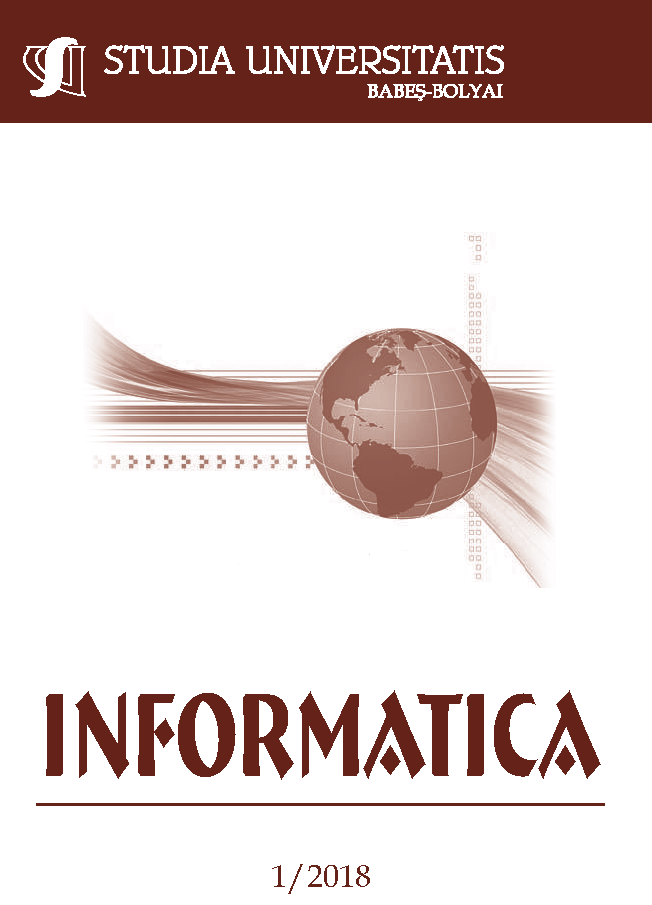MEASURING ENERGY EFFICIENCY OF SELECTED WORKING SOFTWARE
DOI:
https://doi.org/10.24193/subbi.2018.1.01Keywords:
energy efficiency, green software, performance testing.Abstract
Energy consumption is a key performance indicator of any software run on mobile devices. Working or application software is the main category of software where such energy (in)efficient performance becomes accelerated between users and other stakeholders. Measuring energy efficiency is becoming a part of automated and manual performance testing as well – both answering to the increasing usage requirements and addressing acceptance testing optimization. In this paper, we select three software tools – an e-mail client and two social network applications, those energy consumption is being measured and analyzed. We decided to apply very generic profiles during our measurements, where the actions were performed all manually. Our results show that besides the difference in the number of features covered by the software, also their implementation plays an important role in energy consumption. Focusing on a specific feature within the working software does not imply that all quality indicators of it are the best among the software group’s implementations.
References
C. Brandolese, W. Fornaciari, F. Salice, D. Sciuto, The impact of source code transformations on software power and energy consumption, Journal of Circuits, Systems, and Computers, Vol. 11, No. 5, pp. 477–502, 2002.
E. Chovancov´a, M. Chovanec, D. Miˇcuta, Social network and forum hybrid, in Scientific Conference on Informatics, 2015 IEEE 13th International, Nov 2015, Koˇsice, TU, 2015, pp. 124-127, ISBN 978-1-4673-9868-8.
M. Couto, J. Cunha, J. P. Fernandes, R. Pereira, J. Saraiva, Greendroid: A tool for analysing power consumption in the android ecosystem, in Scientific Conference on Informatics, 2015 IEEE 13th International, Koˇsice, TU, Nov 2015, pp. 73–78.
J. Flinn, M. Satyanarayanan, Powerscope: A tool for profiling the energy usage of mobile applications, in Proc. of the Second IEEE Workshop on Mobile Computer Systems and Applications, WMCSA’99, IEEE Computer Society, 1999.
M. Hud´ak, Š. Korečko, B. Sobota, On architecture and performance of LIRKIS CAVE system, in CogInfoCom 2017, Danvers, IEEE, 2017, pp. 000295-000300, ISBN 978-1-5386-1264-4.
R. Jabbarvand, A. Sadeghi, J. Garcia, S. Malek, P. Ammann, Ecodroid: An approach for energy-based ranking of android apps, in Proc. of the Fourth International Workshop on Green and Sustainable Software, GREENS’15, IEEE Press, 2015, pp. 8–14.
D. Li, W. G. J. Halfond, An investigation into energy-saving programming practices for android smartphone app development, in Proc. of the 3rd International Workshop on Green and Sustainable Software, GREENS 2014, ACM, 2014, pp. 46–53.
D. Li, Y. Jin, C. Sahin, J. Clause, W. G. J. Halfond, Integrated energy-directed test suite optimization, in Proc. of the 2014 International Symposium on Software Testing and Analysis, ISSTA 2014, ACM, 2014, pp. 339–350.
K. Liu, G. Pinto, Y. D. Liu, Data-oriented characterization of application-level energy optimization, in Fundamental Approaches to Software Engineering, ser. LNCS, A. Egyed, I. Schaefer, eds., Springer Berlin Heidelberg, 2015, Vol. 9033, pp. 316–331.
N. Pataki, Á . Sipos, Z. Porkol´ab, Measuring the Complexity of Aspect-Oriented Programs with Multiparadigm Metric, in QAOOSE 2006 Proceedings: 10th ECOOP Work- shop on Quantitative Approaches in Object-Oriented Software Engineering, M. Lanza,
F. B. e Abreu, C. Calero, Y.-G. Gu´eh´eneuc, H. Sahraouri, eds., Nantes, Universit´a della Svizzera italiana, 2006, pp. 1-10.
A. Pathak, Y. C. Hu, M. Zhang, P. Bahl, Y.-M. Wang, Fine-grained power modeling for smartphones using system call tracing, in Proc. of the Sixth Conference on Computer Systems, EuroSys’11, ACM, 2011, pp. 153–168.
M. Santos, J. Saraiva, Z. Porkol´ab, D. Krupp, Energy Consumption Measurement of C/C++ Programs Using Clang Tooling, in Proceedings of the SQAMIA 2017: 6th Workshop of Software Quality, Analysis, Monitoring, Improvement, and Applications,
Z. Budimac, ed., Belgrade, Serbia, 11-13.9.2017, Paper No. 15, 8 pages, Also published online by CEUR Workshop Proceedings No. 1938 (http://ceur-ws.org) ISSN 1613- 0073.
J. Saraiva, M. Couto, Cs. Szabó, D. Novák, Towards Energy-Aware Coding Practices for Android, Acta Electrotechnica et Informatica, Vol. 18, No. 1, 2018, pp. 19–25, DOI: 10.15546/aeei-2018-0003.
M. Sul´ır, J. Porubän, Exposing Runtime Information through Source Code Annotations, Acta Electrotechnica et Informatica, Vol. 17, No. 1, 2017, pp. 3–9, DOI: 10.15546/aeei2017-0001.
Cs. Szabó, J. Saraiva, Focusing software engineering education on green application development, in Conference of Information Technology and Development of Education – ITRO 2017, Novi Sad, Serbia, pp. 165–169, ISBN 978-86-7672-302-7.
P. R. Theja, SK. K. Babu, Evolutionary computing based QoS oriented energy efficient VM consolidation scheme for large scale cloud data centers using random work load bench, Annales Mathematicae et Informaticae, 46 (2016) pp. 217–241 http://ami.ektf.hu/uploads/papers/finalpdf/AMI_46_from217to241.pdf.
Downloads
Published
How to Cite
Issue
Section
License
Copyright (c) 2018 Studia Universitatis Babeș-Bolyai Informatica

This work is licensed under a Creative Commons Attribution-NonCommercial-NoDerivatives 4.0 International License.





